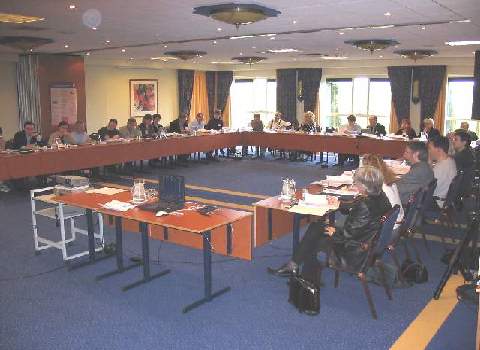Antisense Oligonucleotides in Duchenne Muscular Dystrophy
- Number 128
- Date 22 October 2004
Twenty-four participants from 6 countries (Australia; Belgium; France; The Netherlands; UK and USA) attended an ENMC workshop on the topic of "Preclinical optimization and Phase I/II Clinical Trials Using Antisense Oligonucleotides in Duchenne Muscular Dystrophy".
Duchenne muscular dystrophy (DMD) is a severe muscle wasting condition with onset in early childhood, progressive disability and reduced life expectancy. It is caused by errors in the DMD gene that lead to the failure to produce an essential muscle protein called dystrophin. Most of these errors are deletions, i.e. a portion of the gene is missing. Recent laboratory studies have shown that the addition of small molecules named antisense oligonucleotides to cultured patient muscle cells, and their injection into muscles of a mouse model for the disease can restore the production of the protein dystrophin. Although this is a temporary effect, it improved the structure of the patient cells and mouse muscle. It is therefore hoped that a similar approach, if effective in people, would also be able to slow down disease progression in DMD.
A number of groups are now going to take these observations into clinical trials. In particular 2 European groups, one in the Netherlands and one in the United Kingdom, are planning to perform trials in individuals with DMD to assess if this approach is safe; and if dystrophin production can be restored in a single injected human muscle. Additional laboratory studies are also ongoing as part of the research plan to improve the possibility of future systemic delivery of the antisense oligonucleotides (for example intravenously) instead of direct injections into muscle, as this is the kind of route that would be more clinically useful.
The scope of this workshop was therefore for these two European groups to discuss in detail the procedures that will be followed in the two planned trials so that efforts could be combined in order to maximize the information obtained. In addition the workshop was attended by experts in this field from other countries, and by experts in related fields who had previous experience of using antisense oligonucleotides to treat other disorders.
As with the development of any new drug, ensuring that the product is going to be safe at the dose that will need to be used is a very important issue, and one that cannot be rushed. However, collaborative strategies to tackle several practical and regulatory aspects related to the two planned trials were discussed in order to ensure that both groups could move forward together. Sharing the burden and insights of the extensive safety and efficacy testing of the reagents will mean that the trials can be completed sooner, and plans to share data generated in the two studies means that the results will be optimally comparable between the two groups. All parties also agreed to form an International Consortium on Antisense Oligonucleotides in Duchenne muscular dystrophy. The need for good and standardized patient information about the planned study was highlighted, and this will be developed and disseminated via the ENMC website.
An extended report of this meeting has been published in Neuromuscular Disorders.You can access the publication by clicking on the following link here.
Prof. Francesco Muntoni1, Prof. Kate Bushby1 and Prof. Gertjan van Ommen2; UK1and The Netherlands2.

ENMC
Lt. generaal van Heutszlaan 6
3743 JN BAARN
The Netherlands
+ 31- 35-5480481
enmc@enmc.org
We may request cookies to be set on your device. We use cookies to let us know when you visit our websites, how you interact with us, to enrich your user experience, and to customize your relationship with our website.
Click on the different category headings to find out more. You can also change some of your preferences. Note that blocking some types of cookies may impact your experience on our websites and the services we are able to offer.
These cookies are strictly necessary to provide you with services available through our website and to use some of its features.
Because these cookies are strictly necessary to deliver the website, refusing them will have impact how our site functions. You always can block or delete cookies by changing your browser settings and force blocking all cookies on this website. But this will always prompt you to accept/refuse cookies when revisiting our site.
We fully respect if you want to refuse cookies but to avoid asking you again and again kindly allow us to store a cookie for that. You are free to opt out any time or opt in for other cookies to get a better experience. If you refuse cookies we will remove all set cookies in our domain.
We provide you with a list of stored cookies on your computer in our domain so you can check what we stored. Due to security reasons we are not able to show or modify cookies from other domains. You can check these in your browser security settings.
These cookies collect information that is used either in aggregate form to help us understand how our website is being used or how effective our marketing campaigns are, or to help us customize our website and application for you in order to enhance your experience.
If you do not want that we track your visit to our site you can disable tracking in your browser here:
We also use different external services like Google Webfonts, Google Maps, and external Video providers. Since these providers may collect personal data like your IP address we allow you to block them here. Please be aware that this might heavily reduce the functionality and appearance of our site. Changes will take effect once you reload the page.
Google Webfont Settings:
Google Map Settings:
Google reCaptcha Settings:
Vimeo and Youtube video embeds:
The following cookies are also needed - You can choose if you want to allow them:
You can read about our cookies and privacy settings in detail on our Privacy Policy Page.
Privacy Policy